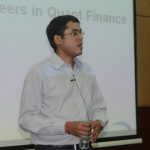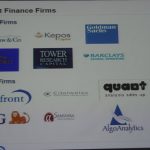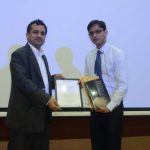- February 23, 2013
- Posted by:
- Category:BLOG, Career Event, Careers, Speaker Events
IAIP organized Career Day Event on 18 Feb 2013 in Mumbai focused on niche & emerging areas of PRIVATE EQUITY & QUANT FINANCE. The event was well attended by around 60 participants, which included candidates as well as member charter holders . Majority of the participants in the event were either in their early careers or were yet to begin their careers.
The event started with Biharilal Deora CFA, Director IAIP, welcoming all participants and giving them an overview of the event. This was followed by (1) audio replay of HBR Ideacast, (2) session on Quant Finance by Nalin Moniz, Principal, Forefront Capital Management and (3) session on Private Equity by Amit Jain, Blackstone Advisors; both the speakers being introduced by Namit Arora CFA, Director IAIP. The event concluded with vote of thanks by Anil Ghelani CFA, Director IAIP.
Quant Finance…
In his presentation on Quant Finance Careers, Nalin Moniz walked through the details on what is Quant Finance Career all about & what it takes to succeed in that area. He began his presentation with a quote by Marc Andreessen that “Software is eating world”. Software has entered in the world of trading & capital markets. Advent of program trading is acting as catalyst of massive changes in trading. Few reasons due to which program trading is becoming popular are : Algos are more efficient in spotting & execution of opportunity, shrinking margins in broking business, ETFs becoming substitutes for active management, algos accounting increased share of total trading & Interconnected global markets. These program based trading software are designed using Quantitative techniques. Hence, quant finance is intersection of Statistics, Computer programming & Finance. He explained that application of quant finance is on both buy side as well as sell side. On Buy Side, the usage is more towards modeling the future i.e. predictive modeling eg: predicting what values NIFTY can take tomorrow. These models are built generally applying multi variate statistics of regression etc, using the softwares like Pythan & Matlab. On finance side knowledge, these models require application of economics. On Sell side, Quants is used for Pricing & Risk Management purpose. Eg: computation of option IV. These models use mathematical tools like Ito calculas, differential etc.. These are models based on high science & make use of programming language C++.
Nalin explained that since it is at cusp of Statistics, programming & finance, usually people from engineering or hard science background are preferred. Knowledge of Programming is key. Apart from technical skills it is important to be passionate about all the three areas which quant finance embraces in itself, having economic intuition about dynamic events, ability to simplify the models for presenting it to end users. Further he stressed that apart from knowing where Quant will work, it is important to know where Quant will not work.eg: quant finance doesn’t work in small and mid-cap due to information asymmetry and limited liquidity. Lack of knowledge in this area can cause tremendous consequences. Some of the areas where quant is being currently used is Dynamic Asset Allocation, Structured products in Pvt. Banking space, Portfolio mgt for ETFS on buy side & prepayment modeling for US mortgages & Algos for trading, post trade analytics on sell side. Few areas where Quant can gain momentum in coming years, in India are PMS, Alternate Investment Funds, structured products on buy side & jobbing, arbitrage in equities, Credit derivatives, credit Indices in Fixed Income space on sell side. This will lead to further increase in share of algo trading. He mentioned that Quant Finance as an Industry is at nascent stage, early movers into it will have competitive advantage.
Private Equity…
Amit Jain started with the simple concept as to why Private Equity (PE) market exists – to make money (we all exist for the same reason!) He then explained the role of Private Equity as an asset class is to:
- Price when capital markets can’t price
- Make capital available when capital market can’t provide it
- Maintain autonomy and obtain all the benefits of a strategic partnership
He spoke about PE investment as a long term investment vehicle and it bets on company management and its strategic advantage to give a superior return while a hedge fund is more opportunistic and time sensitive. The PE funds do a lot of diligence before getting into any deal.
He mentioned about a typical PE model: Raise funds (through institutional investors), invest capital, partner with portfolio companies, exit investment, return capital. He made an interesting point that people who do day trading multiply their money two times in 20 days while PEs do the same in 2 years. The difference is in the amount – managing $20 billion is very different from managing 10 lakhs. He then explained the concept of 2/20 i.e. you get 2% of funds raised as management fees and 20% of profit earned by investors.
He then explained ways in which PEs generate value:
- Growth (10-15%): They invest in growing companies and manage the challenges of their growth. They bring operational excellence by bringing their team of experts so that the entrepreneur can focus on his core skills.
- Financial engineering: They put a lot of money; restructure their debt, pay down expensive debt, etc. They do a thorough understanding of finances of the company and reduce their overall cost of capital.
- Multiple expansion: They use their network and market understanding to change the positioning of the company, give them entry into new markets, etc. e.g. Blackstone invested in a intelenet BPO and opened their portfolio companies for intelenet as clients.
- Governance: A large PE player also brings best governance to bring the governance gap (independent board members, advisors, subject matter experts, etc).
In the end, he mentioned challenges of being in the PE business. They evaluate 2000 deals per year with a small team. He mentioned four qualities of a successful PE are Commercial Acumen – to read the story behind number, passion & perseverance – ability to reject a deal sensing it to be dangerous even though lot of work has gone to evaluate it, managing different latitudes – ability to deal with regulators, CEOs etc. And some element of luck!
You need the ability to ask right questions to arrive at your decision! It looks like too much to handle but the joys of supporting so many families (employees of your portfolio companies) and the returns justify the pains.
Post presentation, session was thrown open for Q&A. Both the speakers addressed the various questions raised by enthusiastic audiences.
Contributed by: Rajni Dhameja, Abhijeet Bhandari CFA and Kunal Sabnis CFA all IAIP Volunteers.
Photographs by: Santosh Samal


























[…] Insights into making Career in Private Equity & Quant Finance […]